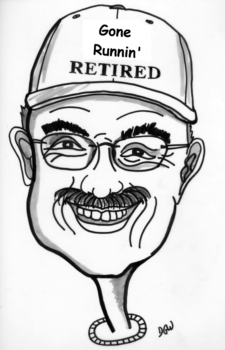Have you ever thought, “What if?” Looking back on life decisions and lost opportunities, there were many forks in the road that would have taken your present life to a different destiny and disparate accomplishments.
If I could hit a curve ball, my running achievements may never have come to pass. I started playing organized baseball in Little League at nine years old. Though not spectacular, I played well enough to be one of eighty-four 13-year-olds to play in the city-wide Salt Lake City Police League and then one of eighty-four 14-year-olds the following year.
After that year, my family moved to Fairfax, Virginia. As a Freshman, I tried out for the Fairfax High School JV Baseball team. I was new to the area, and the coaches had never seen me in local youth leagues, so they had to do a quick tryout before the cuts.
I was hitting well for power and only tried out hitting right-handed. Carl Goodiel had a great 1-7 curveball. He threw at least one perfect game in his senior year of high school. Hitting right-handed, I couldn’t stay in the box. I probably should have moved to the left box to see if it made any difference, I didn’t, got cut and started running track my Sophomore year.
“Trouble with the Curve?” turns to a life of chronic distance running. But I still love the game of baseball and its strategies and nuances.
The day after the 2024 Boston Marathon, Donnie Johnston’s column in the Free Lance-Star complained about the pitch clock used in major league baseball and how it detracted from the game’s strategy. His analogy was that making a pitcher throw a 99 mph fastball every 15 seconds would be equivalent to making a sprinter run a 100-meter dash every 15 seconds.
I could not let it go, so I wrote a letter to the editor. It took two months but appeared in the Sunday, June 16 edition. For those who don’t get the Free Lance-Star, here it is:
—
Ironically, in the week that Sisay Lemma and Hellen Oribi ran 100 meters 421 consecutive times without stopping or timeouts in less time than the typical Major League Baseball game, Donnie Johnston’s To the Point column compared pitchers to runners.
Does this mean that runners are more intelligent in their craft than pitchers and can figure out the best strategy to win?
Baseball players get astronomical salaries because they are in the Entertainment Industry. If they don’t sell tickets, there won’t be money to cover their wages. So, they need to produce an entertaining product. MLB instituted rules to make a more entertaining product, and the players need to adapt their strategies to the rules. Maybe throwing repetitive 98 mph fastballs is not the best approach. Where will the next knuckleballer come from?
Runners don’t get paid unless they win.
—
This year, many pitchers have been injured from throwing too hard. Paul Skenes is the latest pitching sensation, throwing more than 50% of his pitches over 100 mph. He’s even getting standing ovations from opposing home crowds. How long will his arm last?
The rule is to return “America’s Past Time” entertainment value to its enjoyable roots. Players are smart and will adapt,
